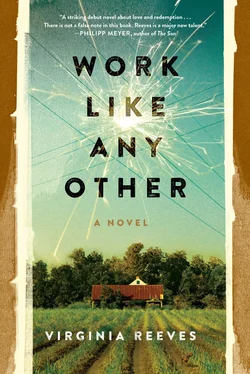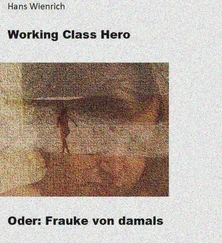We said “Amen” together and worked through the meal without talking. I ate everything Moa put on my plate. I took second scoops and thirds. More, please. I had missed that food so much, and my mind could fix only on the plate and the fork and the knife, the meat dipped in the sweet-salty syrup of the beans, the moist corn bread spread thick with butter I had not tasted in years. Spices mixed with the peaches, clove and cinnamon, the greens bitter and sharp. The wallpaper didn’t matter, nor the company, the whiteness of the clapboards outside, the absence of the creeper, the new brick walkway, not Maggie lying there, the shop and its thresher, the growing crops. I was just a man eating his dinner.
“Thank you, Moa.”
“You are lucky I am a God-fearing woman, Mr. Roscoe. I’ll get the pie.”
It was peach, and she drizzled it with fresh cream.
“Another?” she asked when I finished my first piece.
“Please.”
Neither Wilson nor Moa had seconds, and they watched me with caution and worry as I finished mine. I wanted to rest a minute more in that food before they told me what was drawing all those lines across their foreheads.
“We’re living in this house now, Roscoe,” Wilson said. Crust was still on my plate, a few slivers of peach, a pool of cream. “Marie set us up here when she went to Mobile.”
It had never been my home — that big house. Not before, not then, certainly not now. “How often does she come back?”
“Infrequently,” Moa answered.
Nothing was left for me to do with the last of my pie but to push it away. “Who’s running the land?”
“We are,” Wilson said.
“Yes, but who’s paying you?”
“ We are,” Moa repeated. “It’s been a while now.”
“How long?”
“Five years.”
I didn’t know how to put Moa and Wilson in Marie’s house and Marie in a school in Mobile. Did she have a view of the bay, gulls out the windows distracting her students?
“Where are your children?” This was the question I set upon, though it was the least of my interests.
Moa started gathering plates. “I can’t do any more of this. I’ll go get started on the dishes and send Jenny out for the rest.”
“So Jenny is here?”
Moa huffed and pushed through the door.
“You’ll have to give her some time,” Wilson said.
A beautiful, dark woman came out from the kitchen, hair in braids to her shoulders. She looked like her parents, but only their best parts. “Jenny,” I said, “you were just a little one the last time I saw you.”
She looked to her father.
“It’s all right, honey. Just clear the table.”
It took her three runs to and from the kitchen to get it all.
I didn’t speak again until she was done. “Am I that awful?”
“We aren’t sure.”
I pressed my thumb and finger into my eyes until I saw red sparks against the backs of my lids. The food turned against my insides, and I yearned for Kilby, for the ease of routine, the simplicity of my meals and lodging.
My stomach doubled over itself, and I pushed myself quickly from the table, overturning my chair. I didn’t make it off the porch, but I got to the railing, and I heaved my dinner into the decorative shrubs that now lined the house. Maggie stood at attention on the walkway, unsure what to make of me. My body wouldn’t stop until everything was gone. When I could stand, I headed to the pump by the shop, bringing water up first to wash my face and mouth. Pumping with one hand, I held my head under the spout, the cold water shocking me conscious. Water ran in and out of my mouth, down my cheeks and chin, soaking my collar. I filled a rusted bucket to wash away the mess I’d made of the bushes, and like Jenny and her dishes, it took three trips. Maggie trotted along behind me.
I told myself to write Taylor a letter thanking him for that dog.
Wilson came out on the porch once I’d finished. I was sure he’d watched from a window.
“If it’s all right, I’ll hear the rest tomorrow,” I said. “I’d like to sleep now.”
“Course. Help me pull a few things from the shop.” Inside, Wilson threw a switch to cast the whole space with light, my thresher before us. “We’re still using it. We’ve had electricity a long time now — legally, that is. There was a big push right after we went away to electrify us backcountry folks. They used your same route.”
He was telling me how inequitably priced my project was, how much we’d lost for a gain we would’ve gotten just a little ways down the road.
Wilson pulled two oil lamps from behind a jumble of machine parts. “There’s oil in that can behind you. The lines are in.” I filled the lamps’ bases. “We just haven’t gotten them run through all the buildings. Could be something for you to do, if you want.”
“Where am I sleeping, Wilson?”
He handed me one of the lamps and a box of safety matches, yellow and wooden.
THEtrail from the house had grown over, the grass itchy through my trouser legs. I could see that walk I took out to the north field, excited to tell Wilson about my plans to electrify the farm. “I’ll do this thing,” I’d said, “or I’ll leave.” They had seemed exclusive — the doing and the leaving — but I know now that they had always been entwined. The doing set in motion the leaving, which I suppose set in motion the return.
“We’ve not had time to keep it up,” Wilson said, as we emerged into the field where his old house stood. “But it’s yours as long as you want it.”
The brush had crept closer to the cottage, some of the old pines felled by hand or on their own. Creepers had taken over most of the siding, the few exposed planks closer to mulch than wood. New sounds ran their way around us — creaks and rattles, glass gone to shards in several of the windowpanes.
“Too much to do on the land,” Wilson said. “Too much to do at the big house.”
I was glad of the ruin, grateful to see something that had aged as much as I had. “Is there furniture?”
“Table and chairs. I won’t make any claims about the cleanliness, but there are beds to sleep in, plenty to choose from.”
The evening was bringing a chill, and I’d left my jacket in the big house. “There are blankets inside?”
“Plenty.”
“Thank Moa for the meal.”
“I will.”
I watched him walk through the grasses and brush. I should have called out, offered some sentiment about this place where we’d found ourselves. Instead, I went inside the cottage. The door latch was misaligned with the plate, unable to catch and hold. I would straighten it in the morning, drill new holes for the hinges, replace the rotted pieces of the doorframe.
“Come on,” I said to Maggie. “It’s not much more than your shed.”
She curved her spine in nervousness, tucked her ears close to her head, the ends trailing down her neck.
“Come on.”
She wouldn’t come.
The gloom of evening was already thick inside the cottage, and I lit both lamps to fight it off. A long table and benches stood in the center of the main room, cupboards along one wall, a sink with a hand pump, ladder-back chairs, a blackened stove in the corner. Two small bedrooms were on the left — one for the parents and one for the children. The outhouse was around the side.
I hoped for food in the cupboards and was rewarded with a few jars of pickled beets, peaches, and a small sack of dried meat. The sack was mouse chewed, the meat gnawed, but it was enough to coax Maggie in.
Maggie didn’t understand why she was in this house. She wasn’t hunting anyone, wasn’t working. She took the meat and chewed it slowly, her head hung with the effort. I closed the door behind her and sought out a broom in one of the cabinets. A dead mouse was in one of the corners, and when I opened the stove, I found three sparrows. They must’ve come through the chimney and gotten stuck inside, dying of thirst and starvation in that dusty tomb. I scooped them onto the pile I’d gathered and edged it all to the door. I again saw those chalky bodies drop from the hayloft of my parents’ barn, and I thought of the comfort I’d taken in my sister’s company. We’d shared our exile then, just as I was sharing it with Maggie now.
Читать дальше












